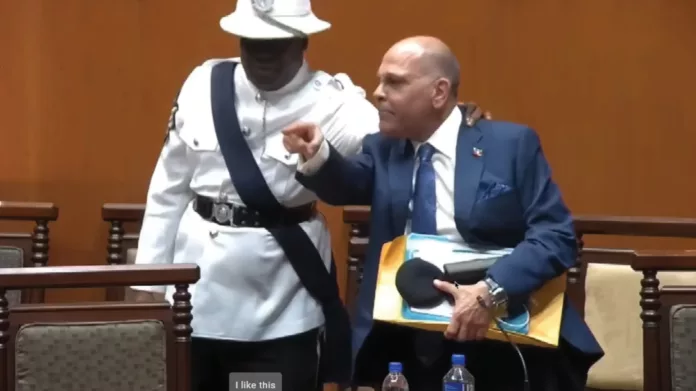By Robert A. Emmanuel
Attorneys for St Peter MP, Asot Michael, have issued an official response to the Speaker of the House, Sir Gerald Watt, calling the decision to suspend him for three consecutive sittings of Parliament “unlawful” and “unconstitutional”.
In a letter dated May 22, Hugh Marshall Jr wrote to the Speaker laying out their legal arguments.
The lawyers claimed that the House had no power to make standing orders providing for the suspension of a member. They said even if the House did have authority to make such rules, it had no power to make them to suspend a member for three or more sittings.
They also argued that the suspension was “imposed for the improper purpose of punishing our client and was not reasonably required for the regulation of the affairs and proceedings of the House”. They added that the suspension was “not effected in accordance with the mandatory procedural steps”.
“We request that you [the Speaker] confirm in writing that you will not take any steps to exclude or cause to be excluded our client from the next, or any subsequent, sitting of the House, whenever that should occur,” the letter stated.
Unless they receive that written confirmation by close of business on Thursday, the attorneys said they will be compelled to commence appropriate legal proceedings.
The contentious moment in question arose during the debate over an amendment to the Criminal Prosecution Services Act where MP Michael in verbal exchanges with the Prime Minister and Attorney General was thrown out of the session by the Speaker.
During a tense exchange with the Speaker, in which the MP called Sir Gerald biased in his ruling, the Speaker proceeded to name the St Peter representative and suspend him for three sittings.
Meanwhile, the opposition party, United Progressive Party, have also called the actions of the Speaker biased noting that the Speaker “left no room for a ‘no’ vote” on the matter.
The party said while they did not condone the statements made by the MP during the debate, calling them disrespectful to the Speaker and the House, they argue that the Speaker chose to victimise the MP for his “human response to the gross provocation”.
Sections 49 and 50 of the standing orders outline the general provisions for the suspension of any member of Parliament by the Speaker of the House.
The powers of the Speaker under these rules include that, after warning the member, the Speaker may direct the member to discontinue his speech, resume his seat, or direct that he withdraws from the chamber for a specified period of time.
If the Speaker believes that the member has engaged in gross misconduct, he may ask the member to withdraw at once from the House during the rest of that day’s sitting.
According to section 50(7) the Speaker may, if he believes the above powers to discipline are inadequate to deal with the situation, follow certain procedures. They are that the Speaker shall mention the member by name, and then “immediately following the naming, a member shall move a motion that [name] be suspended from the service of the House; the Speaker shall put the question that [name] be suspended from the service of the House”.
“This question must be resolved without amendment, adjournment or debate,” it continues.
Michael’s lawyers say that at the time of naming him, no member responded. “At no time did any member move a motion nor was any motion seconded,” the letter said.
Once a member has been suspended according to section 50(7), the first time would be for three sittings, and the second time in a session the suspension will be for six sittings. With any other occasion within the same session, the suspension will last until the House orders that the suspension be terminated.
The rules also state that any personal remuneration or allowance to which a parliamentarian would be entitled to as a member of parliament will cease for the period of his suspension.

